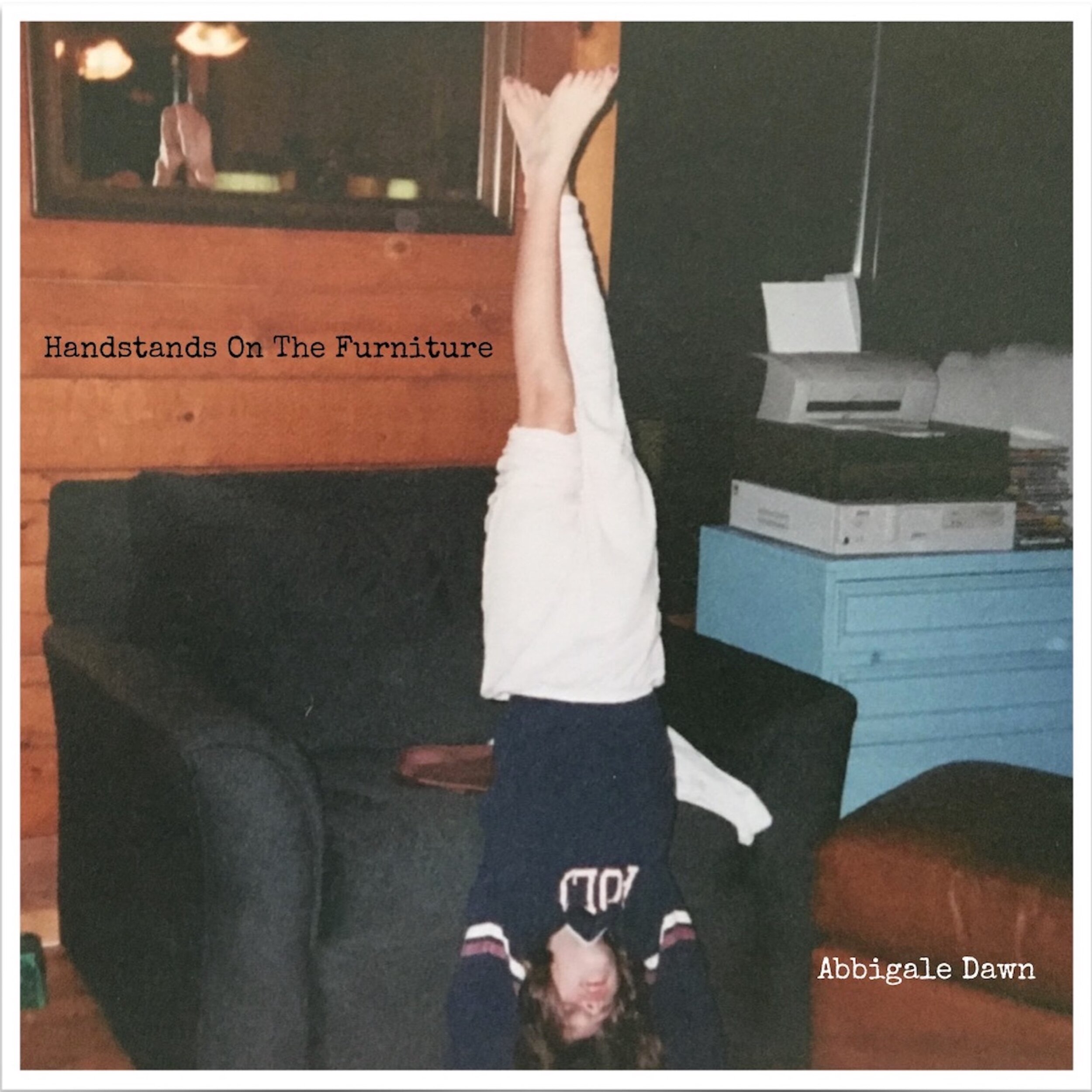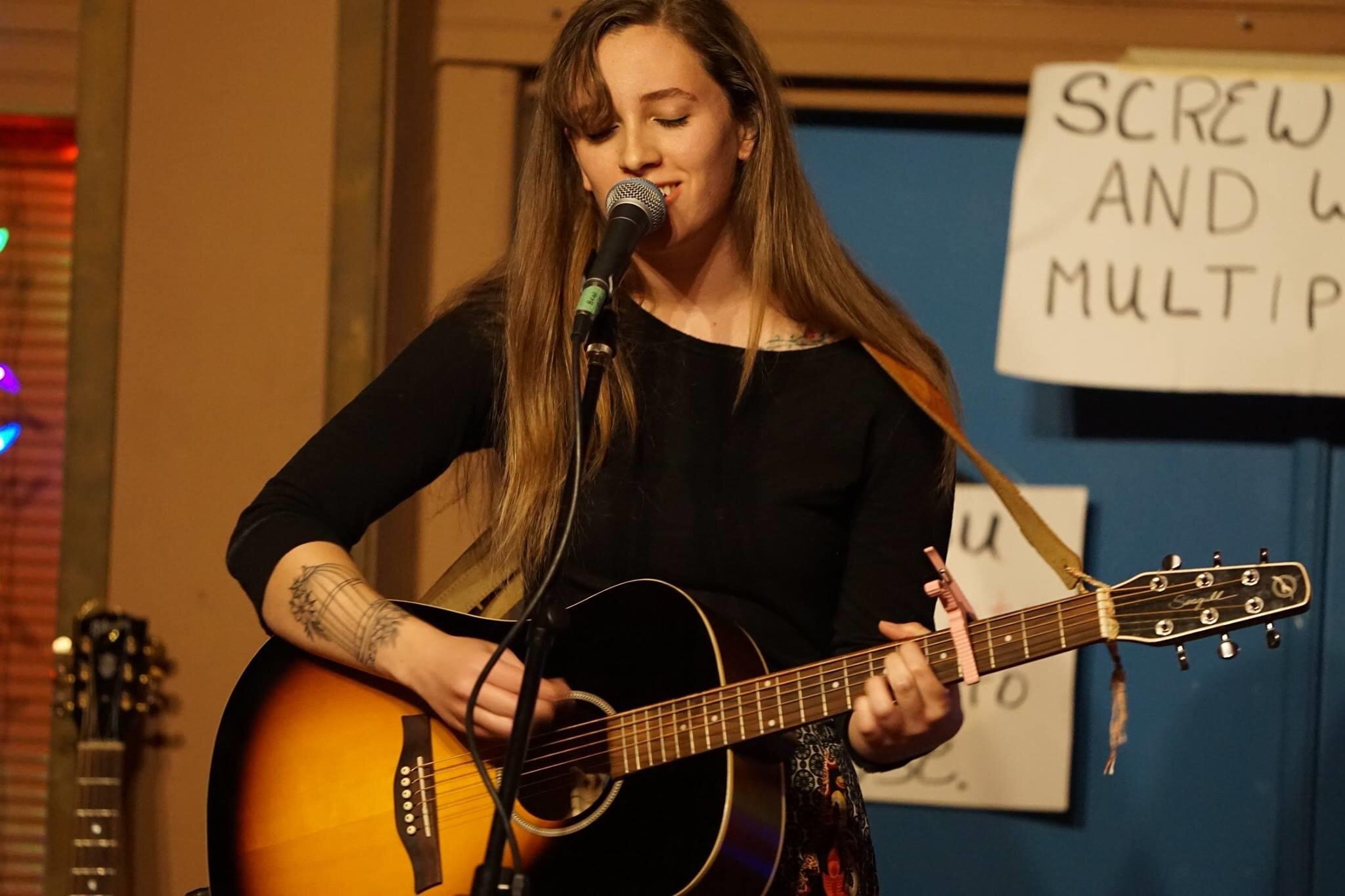"Handstands on the Furniture" by Abbigale Dawn - Interview & Review
By Elecktra Stanislava
Abbigale Dawn released her second EP Handstands on the Furniture on August 31st, 2020. The album was written, produced, mixed, and mastered by Abbigale Dawn at her home studio in Lakewood, CO.
Abbigale Dawn: Vocals, Acoustic Guitar
Gabee Rolla-Danley: Mandolin, Electric guitar, Vocals
Sarah Reid: Violin, Vocals
Kiel Dehnhart: Organ, Bass
Angelique Montes: Cello
Joe Harkins: Piano
Abbigale Dawn, Gabee Rolla-Danley, and Sarah Reid co-wrote “Norman Train”
Abbigale and I have known each other for a couple of years, having worked together before her move from Oklahoma. I had the pleasure of getting to know her songwriting process better in this interview.
Q: What are you passionate about?
A: I’m passionate about a lot of things, but I’ve always wanted to be a novelist. I feel strongly about equality and justice. I love nature, travel, art, animals, and good food.
Q: How long have you been playing and writing music?
A: I started learning to play a keyboard when I was around 13 and began forming some poetry/songs around then as well. I didn’t begin learning guitar until I turned 15 and quickly dropped piano to learn guitar exclusively. I took a few lessons from my childhood babysitter and another from my cousin. Then I became mostly self-taught after that.
I’m currently 25, so I’ve been songwriting for about 12 years.
Q: Who has inspired you to create?
A: I always feel a little inspired after seeing live music of any kind, or listening to a thought-provoking album such as Jeff Pianki’s Remember It Now or Laura Marling’s Song for Our Daughter. I am inspired by artists of all kinds, sharing deep joys and sorrows through their mediums. I am inspired by people living fully without seeking approval.
Q: Who has been supportive of your creative process?
A: So many people have supported me. Many of them are mentioned on this EP, but my husband, Kiel, comes to mind currently. He supports any venture that makes me happy, even though I often bounce around like a pinball, artistically speaking.
Q: You being behind every aspect of making this album shows through in the final product. How did you feel about being in total control?
A: I fought with myself at first not to send this to musicians I view as superior and ask for opinions on every detail along the way. Then I realized asking for an opinion and asking for permission can often be synonymous. After a little while, I got into the groove of just doing -- not talking about it or second-guessing.
When I started to focus on making a project I liked, rather than making a project that is perfect, accurate, acceptable, etc, I began to feel I was making something special. I only showed it to people when I was certain I had something I liked, so I wouldn’t be swayed by approval or disapproval. All the feedback was positive, to my utter shock. It’s a fine line between deaf ears and artistry, but I feel I found a middle ground in staying true to myself and my project, while still accepting criticisms.
Q: What DAW & gear did you use?
A: I used GarageBand software, a little Scarlett solo interface, and a baby bottle microphone. Sometimes I plugged guitars in direct to the interface, and other times I tried to catch a little room noise.
“Connecticut with You” was recorded with room noise, through my baby bottle and an amp. Joe Harkins played while listening to a click and my vocals, and me, Joe’s wife, and Kiel listened to the thunderstorm outside the open window and the piano coming through the amp. That was a pretty special moment.
Samples are bought and borrowed from several public domain online sources, otherwise recorded by me. I love taking samples of birds or brooks or traffic whenever I go on nature walks.
Q: Your opening track, “Lakewood”, is also where you're currently living; do you feel it is a starting point, a home, or just another stop on your journey?
A: Not home. I don’t feel like any of these places have truly been home. In “See You Soon” I mention the house I grew up in and other formative places, but they all feel equally important to me, as I’m sure many other places will be in the future. Lakewood was not just a place, but a state of mind. A piece of my heart was there, just like “Connecticut with You” talks about a piece of my heart being taken to Connecticut.
Q: How have you been holding up with quarantine?
A: I have good days and bad days. I don’t know what the world is anymore. I’ve tried probably a dozen new hobbies from gardening, to watercolors, to roller-skates. All-in-all I think I’m doing well. I have a job and a roof over my head and a wonderful partner, and that’s more than most can say!
Q: Are you still able to perform regularly, or have you had to shift your focus to other work opportunities in the meantime?
A: I’ve definitely had to shift my focus from performing, but music is still a massive part of my life. I’m trying not to let my callouses soften!
Q: What do you think the future will hold for you & your music?
A: Performing has always caused me a lot of anxiety, and I’m a little worried it won’t be a smooth transition once I feel safe doing so again, but who knows? I will say, expect many more releases from me in the coming months/year. I love recording and producing, and have so many more songs to put out.
The Review
The sound of gentle rain sets the mood as a glockenspiel plays a small music box-like melody. However, there is nothing small about the nostalgic, moody atmosphere of Handstands on the Furniture. Abbigale Dawn's second album has a sentimental pining that incorporates an ambiance that feels as if you are sitting with her in a listening room or a coffee shop on a quiet, rainy afternoon.
She has departed from the more full band sound of her previous album, Abbigale Dawn. Although there is less instrumentation, that doesn't leave the tone of her latest work sounding thin. If anything, Dawn taking total control of the entire recording process and production has added more power to her voice. The resonance of her vocals and guitar blend with sampled environmental ambient noise. Her production skills show through with excellently balanced mixing.
Each track is a bottled moment of contemplative longing for the past and a hope for a present full of wanderlust. This longing is not only for the locations that are evoked throughout the album but of the familiar loved ones that make those places special to her.
“Lakewood” is not only the opening track but Dawn’s current abode. As a locale, it may not entirely feel like home to Dawn but is still a refuge. This is where she has chosen, for now, to watch time shifting on. Dawn said that “‘Lakewood’ is about a long-distance relationship so filled with love, and yet so stunted by obstacles.” It is important to note how optimistic Dawn remains in the face of these obstacles, and ultimately she has finally bridged the gap of the long-distance relationship and made a home with her husband.
"Olympia" is filled with the hypothetical what-ifs of possible wisdom and composure gained with age. Perhaps when we are older and more mature these emotions may no longer feel so passionate. With age, we all become more even-tempered as we gain control of our passions. By the end of this song we wonder if perhaps with the wisdom of maturation, we will realize that it is better to part ways and move on.
"Denver" is a song of truth and the distance between us. There is a melancholy so deep our heart aches with Dawn knowing that we can only recover from this longing with the re-connection to the familiarity of a star-crossed lover or friend. However, in this case, we only meet with the disheartening realization that despite the bite of wintry air and the longing for a season change that “it doesn't snow here.”
"Norman Train" was written with Sarah Reid, on violin and backing vocals, and Gabee Rolla-Danley, on electric guitar and mandolin. The collaborative effort between these three powerhouse women leaves no wonder as to why this song sticks in the mind and heart so much.
Heavy on their minds at the time of the writing was the continued deaths and injuries on the nearby railroad tracks in Norman, Oklahoma. In 2017, the City of Norman decided to finally pass a quiet zone ordinance so that the “Norman Train” would no longer blow its whistle so frequently in town. Although statistically speaking there are no more fatalities than before the quiet zone was passed, statistics never meant much to the hearts of those grieving loved ones lost to tragic accidents. From this writing session with Rolla-Danley and Reid arose a memorable song that evokes the place that brought them together, the often tragic history of that place, and the comfort of driving with friends who stay by your side despite troubling times or distance.
In "Santa Fe", Dawn questions reality, time, and the motives of the person this song is addressing. There is a slow build to the awareness, arising from the confusion of perceiving that reality, that perhaps it is more opportune to move on from this relationship that has passed the idealistic phase. You can imagine by the first chorus that Dawn has finally removed her rose-colored glasses and truly sees the situation.
"Connecticut with You" further brings the sense of wanderlust captured in this album with the sounds of a distant plane taking off. Dawn chose to re-record this track also found on her first album. This version is more apt in its forlorn longing. The cello (Angelique Montes), and piano (Joe Harkins), bring the sense of sadness Dawn feels missing a piece of her heart. Her grief is embodied in this recording more so than the version recorded for her first album.
An engine starts then revs. "See You Soon" brings us nostalgic homesickness in its purest form. The familiarity of loss that underlies all of Handstands is distilled into this tune. The answer to this pining is filled by promises of reunification with old friends and their hugs and laughter. During the writing of this song, Dawn had already decided to leave Oklahoma and reconnect with her long-distance boyfriend, now husband. It is as much a love song to the kindred songwriter women and muliebrity she is leaving as it is to her husband whom she has wholly missed after a long time apart in their relationship.
“See You Soon" mentions many places that Dawn has migrated through in her travels. We also find the reason behind the album's title, Handstands on the Furniture, in a recollection of the scents of wisteria and moonflowers in the place where Dawn grew up and once called home.
The theme of places and travel found throughout Handstands seems as if Dawn may not ever settle down in one locale, but she will always carry the places and connections in her heart, no matter where she is. Perhaps her true home is the road with a guitar beside her driving on to the next show to share with us her often raw and introspective songs.
Overall Handstands on the Furniture is a powerful, controlled work thoughtfully captured. Dawn herself had full creative freedom when she recorded, produced, mixed, and mastered. Every nuanced, minute detail of ambient noise transports the listener. The presence and mood of independence gained in Dawn’s mindful voyage through life deliver her perspective meaningfully.



